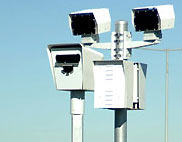9/3/2008
Ohio City Lays Off Workers as Red Light Camera Revenue FallsA boost in red light camera ticket revenue from $606,000 to $1.8 million was not enough to save the Toledo, Ohio city budget.

Despite a tripling of profits from red light camera tickets, officials in Toledo, Ohio warned that even this amount has fallen fall short of their needs. Desperate for revenue, the city had planned on expanding its automated ticketing machine network to issue enough fines to create $2.5 million to spend on vital local projects. For a number of reasons, the city will only rake in $1.8 million in profit. As a result, up to fifteen city workers could lose their jobs by next month.
"I think there will be some layoffs," Councilman George Sarantou told WTOL-Television in an interview. "We've been assured that police and fire will not be part of those layoffs, but we also understand that there will be other departments that will be affected. You will have retirements and not filling positions saves money."
The city was an early leader in photo ticketing and had a clear plan for success. In 2001, Toledo was the first city in Ohio to start a red light camera program and the city has since spent a significant amount of money and effort lobbying the legislature against serious attempts to ban the ticketing technology. This lobbying paid off when former Governor Bob Taft last year vetoed a bill that would have imposed mild restrictions on camera use. Free from such restrictions, ticket profit grew steadily as the city installed new cameras. In 2004, Toledo collected approximately $280,000 in automated enforcement revenues with ten cameras. Last year, twenty-six cameras generated $606,025 for the city. In November, the city approved a new contract with Redflex, the Australian company that runs the ticketing program, limiting the for-profit to pocketing a bounty of just $55 for each ticket.
These changes only boosted the profit to just $1.8 million, an amount falling short of the $2.5 million goal because of three major problems. First, a planned expansion in the number of ticket cameras has been thwarted by technical difficulties. An increase in the ticket price from $95 to $120 that will not pass the city council until February. Finally, the city has experienced a five percent drop in traffic, limiting the number of motorists trapped by the cameras for entering an intersection a split-second after the light turns red.


